10 History Facts You’re Probably Getting Wrong
“It ain’t what you don’t know that gets you into trouble,” Mark Twain once wrote. “It’s what you know for sure that just ain’t so.”
To help you avoid a little trouble in the future, we present a handful of historical myths that are commonly believed, but “just ain’t so.”
1. “Caesarean Section” got its name from Julius Caesar, who was born by this method of delivery.
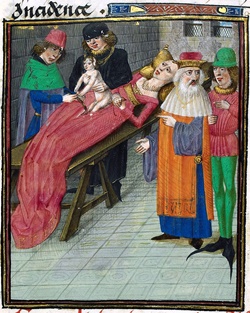
No records indicate Caesar was born by C-section. In fact, doctors in ancient Rome only performed this procedure on mothers who were dead or dying, and Caesar’s mother was reported to still be alive when Caesar was in his 40s. The word “caesarean” is probably an alteration of older Latin words for “cut” or “postmortem birth.”
2. Nineteen women accused of witchcraft in Salem, Massachusetts, were burned at the stake.
No “witches” were burned at the trials, which took place between February 1692 and May 1693. All nineteen women were hanged. Although no Massachusetts women were burned at the stake, it is estimated that many European women were. Of the 40,000-50,000 women who were executed for being witches, burning was the preferred method because it was said to be the most painful.
3. All men in the Revolutionary War era wore wigs.
Wigs became popular in the 1600s when an outbreak of sexually transmitted diseases caused many men to lose their hair. By the 1700s, long hair was still stylish, but wigs were on their way out. A historian at Williamsburg estimates that 5% of the population in colonial Virginia wore wigs.

Soldiers kept their hair long, but they powdered it to make it resemble the powdered wigs of the previous century. George Washington’s hair, which you see represented on the quarter and dollar bill, was all his own.
4. On the night of April 18, 1775, Paul Revere rode through the Massachusetts countryside, shouting “the British are coming.”
The purpose of Revere’s ride was to warn the militias in Concord that the British regular troops were on their way to seize weapons and supplies the patriots had stored there. He was also ordered to warn Samuel Adams and John Hancock in Lexington that the British would probably be coming to arrest them. He did not shout “the British are coming” because it would have made no sense. At this point, most colonists still thought of themselves as British. And he wouldn’t have shouted in general because he was trying to avoid arrest by British regulars on the road.
Revere alerted the militia in Medford and Arlington before reaching Lexington and passing on his warning to Adams and Hancock. Revere proceeded to Concord but was caught by the British, questioned, and released. End of ride.

5. There were no survivors from the Alamo.
After overwhelming the men holding the Alamo in 1836, Mexican troops executed 200 of the surviving soldiers. However, 13 wives and children of Texan soldiers were allowed to leave. The Mexicans also released a slave of William Travis and a Hispanic man who fought with the Texans but convinced the Mexican soldiers he had been a captive.
6. The early days of the American West were a time of widespread lawlessness; shootings were common, as were bank robberies.
The truth of this assertion is hotly debated, with both sides citing quite different figures. However, one statistic shows four Kansas cow towns were more peaceable than their reputations. Between 1870 and 1885, the number of gunshot deaths in Wichita, Abilene, Dodge City, and Ellsworth was 45.
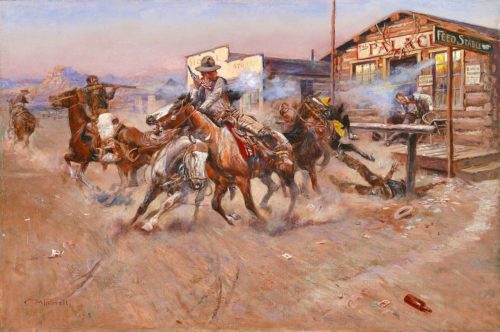
The total number of bank robberies in 15 western states between 1859 and 1900 was probably less than 10. By way of comparison, there were over 4,000 in the U.S. in 2016.
7. Thomas Edison invented the light bulb in 1879.
At least two men were ahead of Edison in the light bulb’s development. In 1802, Humphrey Davy created an electric arc lamp, and in 1840, Warren de la Rue produced a light bulb with a platinum filament.
8. After the Wall Street crash of 1929, many stock brokers committed suicide by jumping out of the windows of their offices.
The suicide rate in Manhattan rose only slightly after the crash. Only two men are reported to have jumped from a tall window. (The rate of suicides was actually higher in the summer months before Black Friday.)
9. Charles Lindbergh was the first man to fly nonstop across the Atlantic ocean.
John Alcock and Arthur Brown flew a Vickers Vimy biplane across the Atlantic in 1919. They took off from Newfoundland and landed in Ireland.
10. Every statue of a military hero on horseback tells the fate of the rider. If one hoof is raised, the rider was wounded in battle. Two hooves raised meant the rider died in battle. And a horse with all hooves down indicated a hero who survived all battles.
This rule of — hoof? — is not dependably true. For example, some of the equestrian statues at Gettysburg follow this code, but not all. In Washington D.C., only a third of 30 statues of heroes on horseback comply with this custom.
Featured image: Shutterstock
The 10 Silliest Clichés Since Sliced Bread
Clichés. They come a dime a dozen; people use them like they are going out of style. Many make sense: it is indeed easier to take the path of least resistance, no one likes a backseat driver, and it’s certainly better to be there than to be square.
But some don’t have any rhyme or reason, others aren’t the sharpest tools in the shed, and still more are dumber than a box of rocks. I don’t want to rain on the parade, but it goes without saying that it’s time to take the gloves off and get down to brass tacks, because I’ve got an axe to grind with the silliest clichés since the chicken or the egg.
1. You Can’t Have Your Cake and Eat It Too. Really? I thought that was the point of having cake. What else are you supposed to do with it? Throwing it at people sounds entertaining, but might lead to negative consequences. In reality, most of the people that have cake will also eat it too.
2. There’s No Such Thing As a Stupid Question. Not true. There are lots of stupid questions. Asking the police officer who pulled you over, “How many stinkin’ cops does it take to screw in a light bulb?” is a stupid question. Asking your significant other, “You’re not going to wear that, are you?” is a stupid question. Obvious questions can also be dumb. “It’s cold out here, isn’t it?” in the middle of a blizzard, and “did that hurt?” when someone slammed their thumb with a hammer are questions that do not make one look very smart. Perhaps we should substitute a better saying: “Don’t be a jerk if someone asks a stupid question.”
3. The Third Time Is the Charm. First coined by Thomas Edison when he invented the light bulb, “the third time is the charm” has changed a lot over the years. The reason is simple: it’s disheartening to hear “the 10,000th time is the charm.” It just doesn’t have the same ring to it. We needed something more inspirational, so we now use this abbreviated version.
4. Dirt Poor vs. Filthy Rich. Well, which one is it? I probably don’t understand because I am mired in the begrimed middle class. Or maybe because I am squalidly average. Or verminously run of the mill.
5. Take the Bull By the Horns. I wonder if anyone has thought about what would happen if someone actually attempted to do this. It definitely wouldn’t be pretty. First of all, it’s highly unlikely that someone would be able to grab the horns in the first place, because they’re attached to two tons of hooves, muscle, and anger-management problems. For the sake of argument, let’s say someone does grab the bull by the horns. Then what? What could a 200-pound man possibly do when he has hold of a 2,500-pound bull’s horns?
6. Don’t Judge a Book By Its Cover.Not always true. Sometimes you can. For example, if a book’s cover says “Random House Dictionary,” or “Auto Repair for Dummies” it’s easy to judge what’s inside. Likewise, if someone’s wearing a football jersey, he or she is probably at least a casual sports fan. Someone wearing a bright orange shirt that says “Inmate: 27634,” has probably escaped from prison, and a good judgment call would be to get as far away from that person as possible.
7. A Stopped Clock Is Right Twice A Day. While true, the real problem is that people say this as if it actually means something. There are 60 seconds every minute, 60 minutes every hour, and 24 hours every day, resulting in a grand total of 86,400 seconds per day. This means that a stopped clock is right 1/43,200th of the time — not a big number and probably why no one pays attention to stopped clocks. If a person is only right 1/43,200th of the time, I’m not going to pay attention to him or her either. And don’t get me started about a stopped military clock.
8. The Five-Second Rule. Amazingly, people are convinced that if a piece of food is on the ground under five seconds, it’s still okay to eat. While it would be nice if this were true, alas, it’s not. It turns out the ground is not very sanitary. For starters, it’s covered in dirt, which is not very clean. That’s why we refer to unclean things as “dirty.” Furthermore, many things on the ground are really unsanitary, like dog poo. Anything that falls on that, even for only four and a half seconds, is not okay to eat. And why the five second time-frame? How is that more sanitary than six seconds? This rule truly doesn’t make any sense.
9. As Pure As the Driven Snow. Where does snow lie? That’s right — on the ground. We just covered why that isn’t pure. Furthermore, water isn’t so pure itself. That is why we have water purification systems. “As pure as unfiltered, frozen water lying on the dirt.”
10. If It’s Not One Thing, It’s Another. No kidding. This is like a doctor saying, “If you don’t have the flu, you must have some other ailment,” or a detective saying, “if the criminal isn’t here, he’s somewhere else.” Certainly, this cliché is true: by definition we must be referring to a thing when we use the word “it,” so when “it” is not one thing, it must be another according to the English language. It’s just that it’s not very helpful, because “it” could be anything and everything else, or “it” could even be nothing at all.
Cartoons: Caution, Cartoonists At Work!
Some of our favorite cartoons from the pages of our magazine with a shirking-work theme:
“Well, it looks like somebody is catching up on his paperwork!”

Don’t you hate when the boss shows up at an inopportune time? I think they have radar for honing in on this sort of thing. The radar doesn’t work when you’re plugging away, just when you relax (okay, goof off).
“Don’t play games with me, Henderson. I know you can hear me. Get on the red-eye back tonight. We need you for the presentation in the morning!”

Whoa—talk about radar. Don’t think you can get out of work by going on vacation, either. I knew I shouldn’t have picked up that seashell!
“I heated the thermometer next to a light bulb so my wife wouldn’t send me to work.”
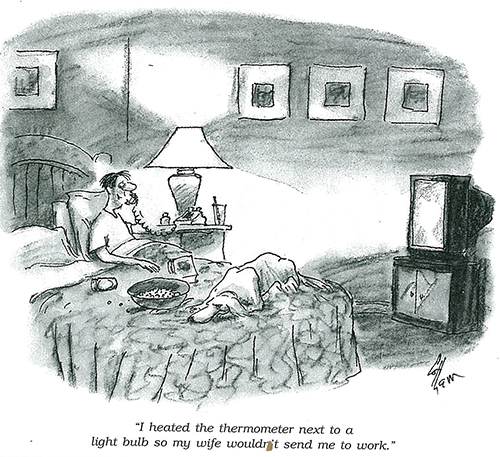
It isn’t just the boss you have to work around sometimes. A day off with the dog, TV, and a bowl of popcorn is just the ticket—even if one has to be devious to pull it off.
“I’ve decided to get up and go to work after all. I’ll call in sick some other day when I feel better.”
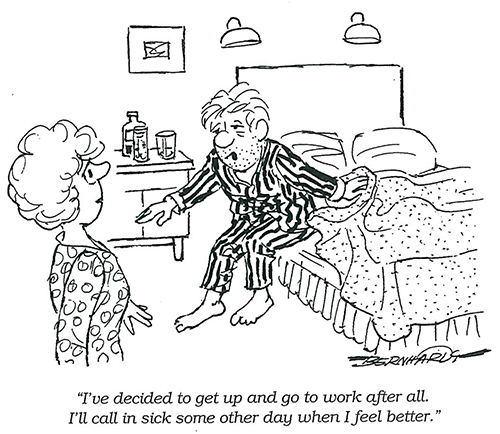
We are an odd species: work when we don’t feel well and stay home when we do. I guess this guy didn’t want to waste a perfectly good sick day.
“His new motto is never put off until tomorrow what you might be able to get out of altogether.”

Some folks just have it down to an art form.
“Could you at least burn a candle at one end?”
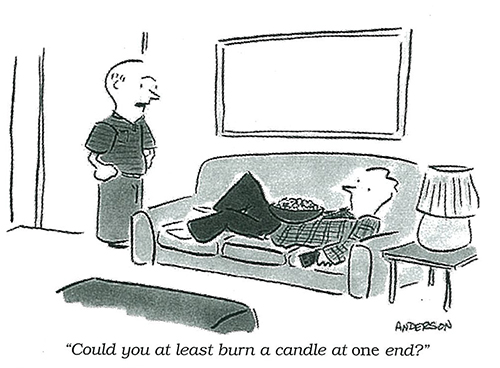
Of course, if you really want to master the art of getting out of work, just study a teenager. Have a safe and happy (Getting-Out-of) Labor Day!
